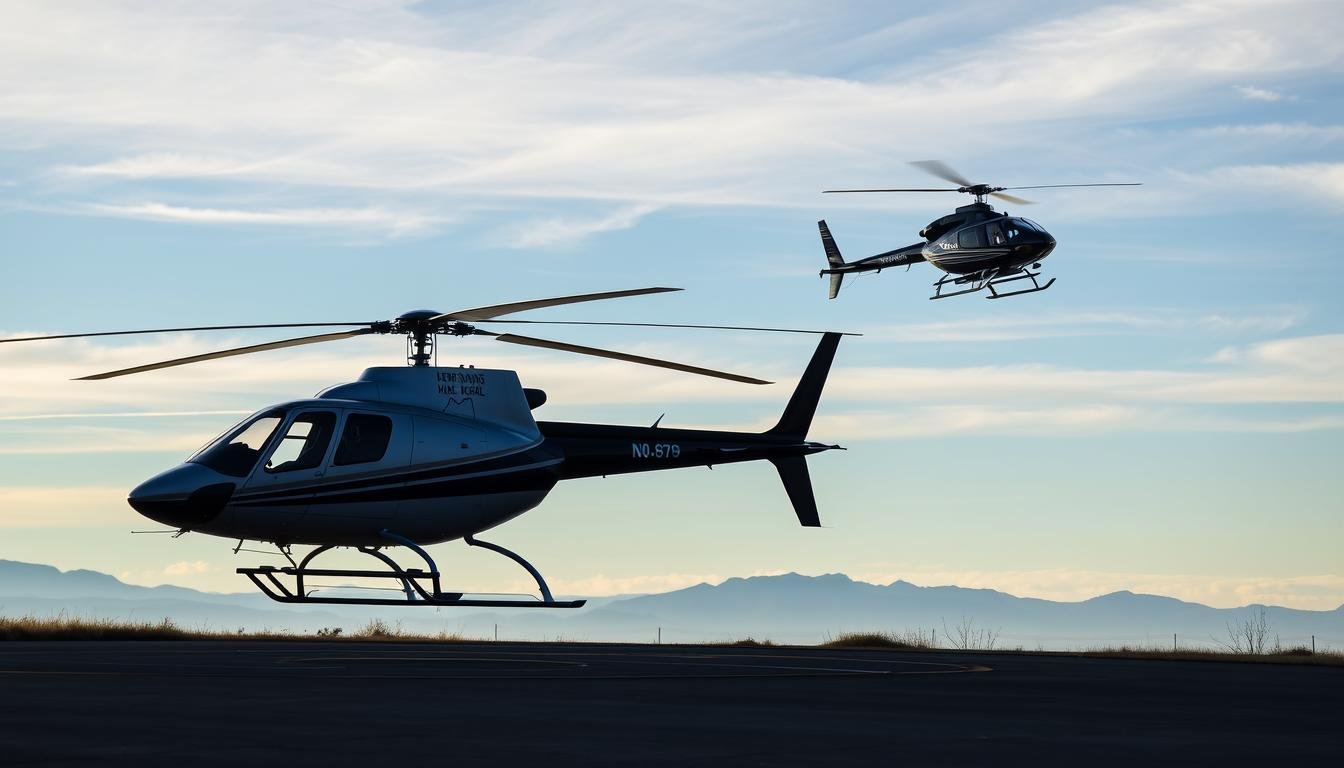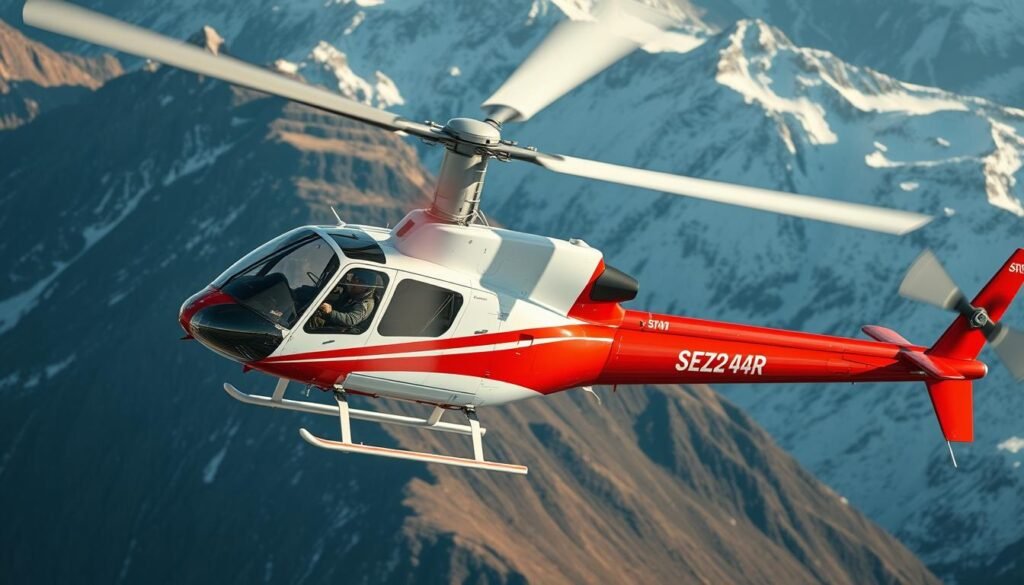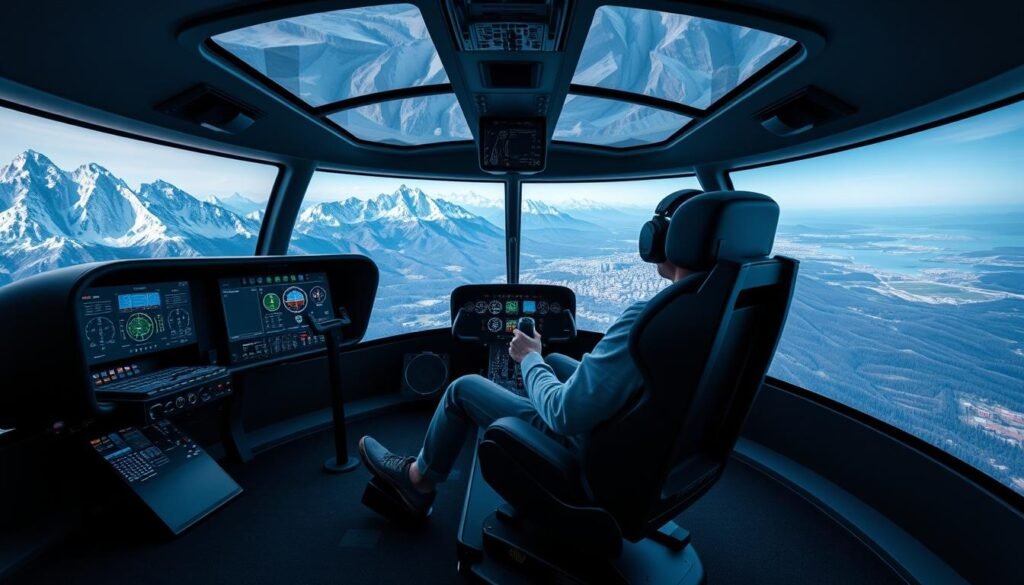Private vs. Commercial Helicopter Pilot Careers opens with a striking fact: nearly half of aspiring aviators report logging 50–60 hours before earning their first license, well above the legal minimums.
This introduction frames the key difference: a recreational license limits flying to personal use, while a paid credential unlocks a wide range of income-generating roles across the industry.
The article maps how training moves from ground school and basic maneuvers to advanced navigation, decision-making, and checkrides. It outlines typical minimums — entry-level students often finish between 35 and 60 hours, and commercial candidates target roughly 150 total hours.
Readers will get a clear view of job types, from emergency services and aerial work to corporate transport, and how choice of path affects cost, experience, and access to financial aid.
The guide sets practical expectations on timelines, likely compensation ranges, and how to align training with long-term goals in U.S. aviation.
Key Takeaways
- A recreational license limits flying to nonpaid activity; a commercial credential permits hired work.
- Training progresses from basic ground school to advanced operational skills and checkrides.
- Typical timeframes: many students finish private training near 50–60 hours; commercial minimums target about 150 hours.
- Job types vary by experience and aircraft: EMS, firefighting, tours, offshore, and corporate roles are common.
- Choosing a path affects costs, aid options, and career prospects in the U.S. aviation market.
Understanding The Private And Commercial Paths In The United States
The chosen training path in the United States shapes the missions a trainee will fly and the rules they must follow. It explains whether someone learns to fly for recreation or to perform paid services.
Private license holders fly for personal travel and scenic rides. They may carry friends and share expenses, but they cannot accept compensation for flights. This restriction is a key regulatory distinction in U.S. aviation.
Commercial pilot credentials allow a person to fly for hire across many sectors. With this license, helicopter pilots can work in aerial tours, EMS, law enforcement, offshore support, agriculture, and utility operations.
- Choice of path affects training hours, equipment needs, and mission planning.
- Operational roles and required proficiency differ sharply between recreational and paid work.
- Clear goals at the outset simplify budgeting, scheduling, and instructor selection.
Deciding early helps align aircraft capabilities, mission gear, and the airspace rules trainees will master. That clarity sets a practical, compliant course for safe, long‑term flying.
Training And FAA Requirements: PPL vs. CPL At A Glance
How a student sequences ground study, flight lessons, and checkrides largely decides the time it takes to reach each certificate under FAA rules.

Private Pilot License (PPL): Minimum Ages, Medical, Exams, And Flight Hours
Key requirements for the private pilot license include being at least 17 years old and holding a third‑class medical certificate.
The candidate must pass FAA written, oral, and practical tests that assess aeronautical knowledge and helicopter handling.
FAA minima are often cited as 35–40 combined flight and ground hours, but many trainees finish between 50 and 60 total hours to show consistent proficiency.
Commercial Pilot License (CPL): Higher Hour Thresholds, Advanced Skills, And Proficiency
The commercial pilot step requires a current private certificate and a minimum age of 18.
Applicants must log about 150 total hours and demonstrate advanced airmanship: navigation, confined‑area work, and scenario‑based decision making.
Instrument study is recommended early to build weather and workload management skills, even though an instrument rating is an additional endorsement.
Timelines And Checkrides: From Ground School To Practical Tests In The Present Day
University programs often pace PPL in two semesters and CPL in two more, while independent schools tailor schedules to student availability.
Most candidates shorten overall time by keeping frequent lessons, integrating test prep early, and choosing schools with testing authority to reduce checkride delays.
| Certificate | Minimum Age | FAA Minimum Hours | Typical Completion | Core Focus |
|---|---|---|---|---|
| PPL | 17 | 35–40 | 50–60 hours | Basic handling, emergency procedures |
| CPL | 18 | 150 | Varies by program | Advanced navigation, confined ops |
| Instrument Study | N/A | Additional | May run concurrently | Weather, IFR skills |
Costs, Time-To-Completion, And Training Pathways
Understanding cost drivers and scheduling differences helps students plan realistic timelines for training. Costs hinge on aircraft type, maintenance rates, and instructor time. That mix changes the calendar to a credential and the total hours learners must log.

University Flight School Versus Independent Flight School: Degree Options And Flight Hours
University programs often bundle tuition with flight hours and offer associate or bachelor degrees. Students typically progress from PPL to CPL inside a set curriculum and graduate with more flight experience and structured time to completion.
Independent schools can be cheaper and more flexible. They suit those who want to get private training quickly or need part‑time schedules, though they rarely offer federal aid.
Financing And Aid: Scholarships, Loans, And Post‑9/11 GI Bill Considerations
Degree programs open access to scholarships and federal loans. Eligible veterans may use the Post‑9/11 GI Bill at approved institutions to offset tuition and flight costs. Independent school students should seek private scholarships and pay‑as‑you‑go options.
Building Experience: Instrument, CFI/CFII, And Specialized Training
Additional ratings—Instrument, CFI, CFII—and modules like NVG, mountain work, external load, and turbine transition add skills and marketability. These steps also create paid opportunities to build hours and depth in the aviation industry.
- Plan fleet availability and maintenance lines to avoid delays.
- Choose instructors who teach operational judgment as well as maneuvers.
Salary, Jobs, And Industry Opportunities For Helicopter Pilots
Compensation and job availability change with experience, location, and specialized training.
Compensation Snapshot: Entry-level work often starts with instructing or tour jobs. Mid‑career roles in utility and EMS can approach or exceed six figures. One industry sample notes that commercial helicopter pilots average about $95,000 annually, but actual pay varies by region and employer.

Compensation Snapshot: From Entry-Level To Average Commercial Earnings
Wages depend on schedule complexity, mission risk, and benefits. Pilots who add long‑line, NVG, or external load training win higher pay and more stable jobs.
“Specialized skills unlock the highest‑paying roles and reduce seasonal gaps in work.”
Public Safety And Emergency Services
EMS and search and rescue require IFR capability, on‑call readiness, and close coordination with medical teams.
Aerial Firefighting And Utility Operations
Firefighting and utility work demand precision, seasonal planning, and strong safety culture.
| Sector | Typical Entry Pay | Mid-Career | Key Skills |
|---|---|---|---|
| Tours & Tourism | $30k–$55k | $50k–$80k | Customer service, VFR ops |
| EMS / SAR | $45k–$70k | $80k–$120k+ | IFR, med coordination |
| Utility / Firefighting | $40k–$65k | $90k–$130k+ | External load, long‑line |
For a deeper pay breakdown and employer comparisons see the pay guide.
Private vs. Commercial Helicopter Pilot Careers: Which Route Fits Your Goals?
Choosing a flight path means balancing everyday enjoyment against long-term financial and time commitments.

Recreational Flying And Ownership Realities With A Private License
A private pilot can carry friends and share expenses and may fly day or night under VFR. Recreational flying offers flexibility and personal travel options.
Ownership, however, adds hangar fees, insurance, maintenance, and unexpected downtime. Those costs often make full ownership unrealistic for many who start with a private license.
Career Trajectory With A Commercial License: Flight Time, Roles, And Advancement
Most students move from a private license toward a commercial credential, then add instructor ratings and specialized modules to gain experience.
- Typical path: PPL → CPL → CFI/CFII and endorsements for NVG, external load, or instrument work.
- Early paid roles include tours and instruction; these build hours for EMS, utility, and corporate positions.
- Target skills: decision-making, weather planning, crew coordination, and structured logbook planning for sector‑relevant time.
Practical note: Match early jobs to strengths—customer service, precision work, or instrument proficiency—to compound opportunities and reduce time to competitive roles.
For a broader comparison of aircraft training paths and market options see this guide.
How To Choose A Flight School And Instructor Team
Choosing the right flight school begins with checking how the program treats safety, aircraft availability, and instructor development.

Evaluating Safety Culture, Aircraft Fleet, And Instructor Experience
Audit safety culture by asking for incident records, SMS documentation, and maintenance controls. Look for formal standardization of helicopter flight procedures and routine stage checks.
Compare aircraft types, dispatch rates, and maintenance facilities. University programs often have larger fleets and in-house shops. Independent schools may offer niche specialization but variable availability.
Vet instructors for operational background, teaching hours, and mentorship skills. Experienced instructors who mentor can accelerate skill development and reduce training errors.
- Structured training: Confirm syllabi, grading rubrics, and staged evaluations used to track student progress.
- Advanced operations: Prioritize schools offering external load, mountain ops, NVG, or turbine training to expand real-world skills.
- Operational reliability: Review weather minima, insurance coverage, and local terrain impacts on scheduling.
Visit the base: Sit in on ground lessons, fly a discovery lesson, and meet instructors to assess communication style and pace.
“Graduation timelines and examiner availability matter; programs with self‑examining authority can reduce checkride delays.”
| Factor | What To Check | Impact On Training | Red Flag |
|---|---|---|---|
| Safety Culture | Incident logs, SMS, SOPs | Lower risk, consistent ops | No formal SMS or records |
| Aircraft Fleet | Types, dispatch rates, maintenance | Less downtime, steady flight time | High maintenance delays |
| Instructors | Operational experience, mentorship | Faster skill gains, better judgment | High instructor turnover |
| Advanced Training | NVG, external load, mountain, turbine | Broader missions, higher employability | No advanced ops offerings |
Check alumni outcomes and employer links as proof of real-world alignment. For a concise checklist on choosing a program see what to consider when choosing a flight.
Conclusion
A concise wrap-up clarifies what each path requires and what it delivers. A recreational route grants a personal license for nonpaid flying; a paid credential opens EMS, tours, utility, agriculture, media, and firefighting roles. FAA minima guide both paths: the private route often lands near 50–60 hours while the paid step targets roughly 150 total hours and full written, oral, and practical testing.
Choose a university program for bundled hours and aid or an independent school for flexibility. Add instrument and advanced ratings to boost employability. Track flight hours, exam milestones, and finances closely, and confirm aircraft availability and exam logistics to avoid delays.
With deliberate training, stacked skills, and steady time on type, an aviator can move from entry learning to specialized services across the rotorcraft industry.
FAQ
What is the main difference between a private license and a commercial license for rotary-wing aircraft?
A private license allows a person to fly for personal and recreational use without compensation. A commercial credential permits paid operations and requires higher flight experience, advanced maneuvers, and stricter knowledge standards. The commercial path also opens roles in emergency services, aerial work, and charter operations.
What are the FAA minimum age, medical, and flight-hour requirements for a recreational certificate?
For a recreational-level certificate, the FAA sets a minimum age of 17 to hold a pilot certificate for powered aircraft, and applicants must pass a third-class aviation medical or meet BasicMed criteria. Flight-hour minimums vary by certificate; private-level applicants must complete at least 40 hours of flight time, including dual instruction and solo flight. Schools often require more hours to ensure proficiency.
How many hours and what skills does an airline of rotorcraft expect for hire at entry level?
Commercial hiring requirements vary by operator. Most regional and utility employers expect candidates to have several hundred hours total rotor time, instrument experience, and often a flight instructor certificate. Critical skills include low‑level navigation, external load work, night hoist operations, and strong decision-making under pressure.
How long does it typically take to progress from a recreational certificate to a professional credential?
Time varies by training intensity and funding. Full-time students can reach a professional credential in 6–12 months, while part-time students may take 1–3 years. Factors that affect timeline include weather, aircraft availability, instructor scheduling, and time spent building required hours for hire.
What are common training pathways: university program vs. independent flight school?
University programs combine academic degrees with structured flight training, often providing a large fleet and longer-term career networks. Independent schools may offer faster, more flexible schedules and lower tuition. Both paths can lead to equivalent certifications; selection depends on budget, timeline, and career goals.
How do students finance training, and what aid options exist?
Financing options include private loans, flight‑school financing plans, scholarships from organizations like the Helicopter Foundation International, and VA benefits such as the Post‑9/11 GI Bill for eligible veterans. Many students mix savings, loans, and work as instructors later to repay debt.
Which advanced ratings and certificates best build experience after the initial license?
Instrument training, Certified Flight Instructor (CFI/CFII) certificates, and type-specific endorsements accelerate experience. CFIs can build hours quickly by instructing. Additional training in mountain operations, external load, night vision goggle (NVG) work, and emergency procedures increases employability.
What is the salary range for rotorcraft operators from entry-level to experienced pilots?
Entry-level pay for new commercial rotorcraft operators can be modest, often hourly or per‑project. Average earnings rise substantially with experience. Mid-career wages for public safety or utility roles are competitive, and corporate or offshore positions can offer high compensation with additional benefits.
What job opportunities exist in public safety and emergency services?
Firefighting, EMS helicopter operations, search and rescue, and law enforcement aviation units hire experienced applicants. These roles demand high proficiency, specialized training such as hoist operations or night vision, and a strong safety record.
How do aerial firefighting and utility operations differ in pilot demands?
Aerial firefighting requires precision low‑level flying, water or retardant delivery procedures, and teamwork with incident commanders. Utility operations involve long-line work, powerline inspections, and construction support. Both roles require discipline, specialized endorsements, and frequent proficiency checks.
Are there steady opportunities in tourism, corporate transport, and media work?
Sightseeing operations, charter services, and aerial cinematography provide varied schedules and seasonal demand. These roles reward excellent customer interaction, consistent flight proficiency, and flexibility. Corporate work often requires polished presentation and adherence to higher service standards.
What specialized work exists in agriculture, surveying, and external load missions?
Agricultural applications include spraying and crop dusting over varied terrain. Surveying and photogrammetry require precise flight tracks and coordination with ground teams. External load operations demand certified rigging knowledge, load calculations, and superior aircraft control skills.
What considerations should guide someone choosing a flight school and instructor team?
Evaluate safety culture, maintenance standards, fleet diversity, and instructor experience. Review the school’s track record placing graduates, aircraft utilization rates, and the clarity of training syllabi. A strong safety culture and experienced instructors shorten training time and reduce unexpected costs.
How does one transition from recreational flying to paid operations?
The transition requires meeting commercial certificate requirements, building required hours, obtaining instrument proficiency, and often gaining instruction experience through CFI roles. Networking, professional mentorship, and targeted endorsements for intended operations help secure the first paid position.
What certifications improve chances for specialized roles like hoist or NVG operations?
Specialized endorsements and course completions—hoist operator training, night vision goggle courses, mountain operations, and external load endorsements—boost qualifications. Employers often require documented course completion and logged supervised experience before independent assignment.
How important is building flight time versus quality of experience?
Both matter. Logbook hours are essential, but diversity of experience—instrument conditions, night flying, external load, and crewed operations—adds measurable value. Quality instruction and documented proficiency in mission-specific tasks make candidates more competitive than raw hours alone.If you’re looking for flexibility, adventure, and personal enjoyment, the private pilot path may be the right fit for you. However, if you’re seeking a professional career with greater earning potential and responsibility, the commercial pilot path is the way to go. Both paths require dedication and training, but choosing the one that aligns with your goals will make the journey more rewarding.
Related Articles
- Women in Helicopter Aviation: Breaking Barriers and Building a Career
- Freelance Helicopter Pilots: How to Build a Successful Career
- Helicopter Pilot Licensing Requirements: A Global Overview
- How to Network and Advance Your Career as a Helicopter Pilot
- What to Expect in Your First Year as a Commercial Helicopter Pilot
More from This Category
- Work-Life Balance for Helicopter Pilots: Managing a Demanding Career
- How to Transition from Fixed-Wing to Helicopter Flying: Tips for Pilots
- The Best Industries for Helicopter Pilots: Job Opportunities Beyond Passenger Transport
- Medical Requirements for Helicopter Pilots: What You Need to Know
- How to Build Flight Hours as a New Helicopter Pilot
- Essential Skills Every Helicopter Pilot Needs to Succeed
- Top Helicopter Pilot Training Schools: How to Choose the Best Program
- Private vs. Commercial Helicopter Pilot: Which Career Path Is Right for You?
- Helicopter Pilot Salary: What You Can Expect at Every Stage of Your Career
- How to Become a Helicopter Pilot: A Step-by-Step Guide



